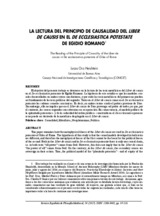Mostrar el registro sencillo del ítem
La lectura del Principio de Causalidad del Liber de causis en el de Ecclesiastica Potestate de Egidio Romano
| dc.contributor.author | Oro Hershtein, Lucas | |
| dc.date.accessioned | 2022-07-18T07:37:59Z | |
| dc.date.available | 2022-07-18T07:37:59Z | |
| dc.date.issued | 2017 | |
| dc.identifier.issn | 2530-7878 | |
| dc.identifier.issn | 1133-0902 | |
| dc.identifier.uri | http://hdl.handle.net/10396/23639 | |
| dc.description.abstract | El objetivo del presente trabajo es detenerse en la lectura de las tesis metafísicas del Liber de causis en el De ecclesiastica potestate de Egidio Romano. La hipótesis de este estudio es que los modelos causales desarrollados en ambos textos son distintos, y por ende las tesis metafísicas del primero no pueden ser fundamento de las tesis políticas del segundo. Tanto en el Liber de causis como en el De ecclesiastica potestate las cadenas causales son únicas. Es decir, en ambos textos «todo el poder» proviene de Dios. Sin embargo, ello no implica que en el Liber de causis de Dios provenga «el poder de todo», ya que, por el contrario, las causas segundas son soberanas en su operación. En consecuencia, el modelo político de la «plenitudo potestatis» - y de la caducidad del orden jurídico - construido en el De ecclesiastica potestate no puede ser derivado de la metafísica desplegada en el Liber de causis. | es_ES |
| dc.description.abstract | This paper examines how the metaphysical theses of the Liber de causis are read in De ecclesiastica potestate of Giles of Rome. The hypothesis of this study is that the causal models developed in both texts are different, and therefore the metaphysical theses of the first cannot be the basis for the political theses of the second. Both in the Liber de causis and in De ecclesiastica potestate there is only one causal chain, i.e. in both texts “all power” comes from God. However, this does not imply that in the Liber de causis “the power of all” comes from God. On the contrary, in the Liber de causis, the secondary causes are sovereign in their action. Thus, the political model of the “plenitudo potestatis” - and of expiry of the legal order - built in De ecclesiastica potestate cannot be derived from the metaphysics set out in the Liber de causis. | es_ES |
| dc.format.mimetype | application/pdf | es_ES |
| dc.language.iso | spa | es_ES |
| dc.publisher | UCOPress | es_ES |
| dc.rights | https://creativecommons.org/licenses/by-nc-nd/4.0/ | es_ES |
| dc.source | Revista Española de Filosofía Medieval 24, 97-116 (2017) | es_ES |
| dc.subject | Causalidad | es_ES |
| dc.subject | Metafísica | es_ES |
| dc.subject | Neoplatonismo | es_ES |
| dc.subject | Política | es_ES |
| dc.subject | Causality | es_ES |
| dc.subject | Metaphysics | es_ES |
| dc.subject | Neoplatonism | es_ES |
| dc.subject | Politics | es_ES |
| dc.title | La lectura del Principio de Causalidad del Liber de causis en el de Ecclesiastica Potestate de Egidio Romano | es_ES |
| dc.title.alternative | The Reading of the Principle of Causality of the Liber de causis in De ecclesiastica potestate of Giles of Rome | es_ES |
| dc.type | info:eu-repo/semantics/article | es_ES |
| dc.relation.publisherversion | https://www.uco.es/ucopress/ojs/index.php/refime/index | es_ES |
| dc.rights.accessRights | info:eu-repo/semantics/openAccess | es_ES |

